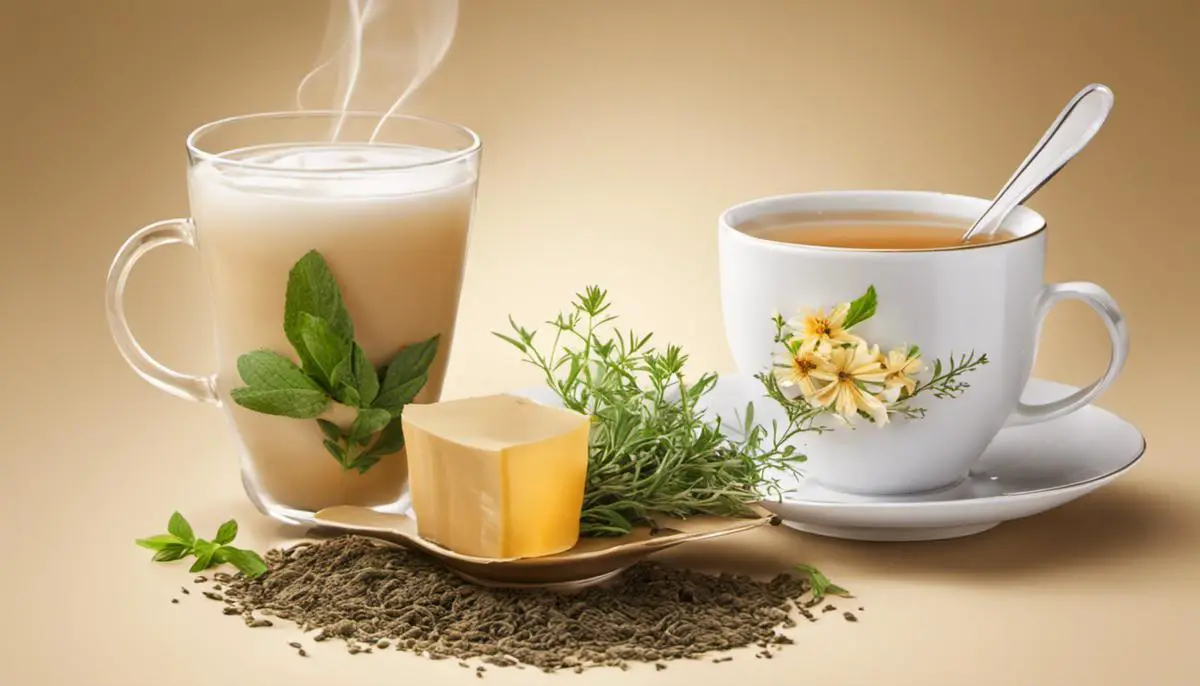In the path of motherhood, one of the few things as crucial as ensuring the health and well-being of a newborn child is the ability to provide sufficient, nutritious breast milk. Mother’s Milk Tea offers a natural and organically-sourced solution for lactating mothers faced with the challenge of milk supply. Created from herbs renowned for their milk-boosting properties, this tea promises potential benefits to mothers’ milk production. This endeavor explores the concept and components of Mother’s Milk Tea, assesses its efficacy through rigorous scientific research, and provides practical insights into preparing and using the tea effectively and safely.
Understanding the Concept of Mother’s Milk Tea
Understanding the Concept of Mother’s Milk Tea
Mother’s Milk Tea is a herbal blend commonly used by breastfeeding mothers to increase their milk production. It is a natural remedy that revolves around the concept of galactagogues, foods, herbs, and medications thought to help boost breast milk supply. The use of Mother’s Milk Tea for boosting supply stems from traditional beliefs and practices which suggest that particular herbs can stimulate the production of breast milk.
The Organic Constituents of Mothers’ Milk Tea
The primary ingredients of Mother’s Milk Tea often include fenugreek, fennel, anise, coriander, and blessed thistle.
- Fenugreek is a well-known galactagogue that has been used for centuries by nursing mothers to boost their milk supply. It’s based on the premise that fenugreek stimulates sweat production, and since the mammary glands are a type of sweat gland, fenugreek may help stimulate milk production.
- Fennel and anise have similar licorice-like tastes and are believed to aid digestion and relieve gas and bloating, which can be beneficial for both mom and baby. They’re also believed to have galactogenic properties that aid milk production.
- Coriander has been traditionally used in many cultures to stimulate milk production as well, though scientific evidence on its effectiveness is limited.
- Blessed Thistle is another common ingredient that has traditionally been used to increase milk supply, particularly in combination with fenugreek.
The Scientific Basis: How the Tea Influences Lactation
While the scientific basis behind some of these herbs and their role from a lactation standpoint isn’t well-documented in modern research, many anecdotal evidences support their effectiveness in milk production. For instance, the primary component, fenugreek, has been shown in several studies to increase milk volume. However, many of these studies were not well-controlled or used a very small sample size, so more robust research is needed to confirm these effects.
Understanding the Effects of Mother’s Milk Tea
For most nursing mothers and their infants, consuming Mother’s Milk Tea is deemed safe and usually well-tolerated. Side effects are not common but may include minor gastrointestinal issues such as gas or bloating, owing to the tea’s herbal ingredients. However, it’s crucial to note that nursing mothers with allergies to plants in the celery family, like fennel or coriander, should steer clear of this tea.
Before commencing any new regimen to stimulate milk supply, it’s crucial that nursing mothers contact their healthcare providers. Although Mother’s Milk Tea could potentially offer benefits, it must be used in conjunction with a comprehensive lactation support approach. This strategy should prioritize proper nutrition, hydration, sufficient rest, and a breastfeeding-friendly environment.

Scientific Evidence Behind the Efficacy of Mother’s Milk Tea
Evaluating Scientific Studies on Mother’s Milk Tea
Many studies have touted the benefits of mother’s milk tea for bolstering milk supply. For example, an investigation shared in the Journal of Human Lactation cited that herbal teas such as mother’s milk tea could have encouraging galactagogue effects—meaning they can facilitate increased breast milk secretion. A separate study in the Journal of Dietary Supplements deduced that the herbal constituents in mother’s milk tea demonstrated positive impacts on lactation outcomes. But these are just glimpses into a much vaster field of research.
Nonetheless, further scientific corroboration is necessary to validate these conclusions. Several clinical trials propose benefits of mother’s milk tea, although many have methodological limitations and restricted range. There also exists a variance among these trials, as some utilise different herbal compositions and others differ in dosage terms.
Active Ingredients in Mother’s Milk Tea
Inspecting the ingredients of mother’s milk tea, one can understand why it might help boost milk supply. Fenugreek – an herb with a long history of use as a galactagogue – is a prominent ingredient. Studies published in the Journal of Alternative and Complementary Medicine and Phytotherapy Research show that fenugreek can effectively increase milk supply in mothers.
Fennel and anise, two other ingredients commonly found in mothers milk tea, are believed to have galactagogue properties as well. Though more scientific research is needed to support these claims.
Empirical Accounts Regarding Mother’s Milk Tea
Beyond the realm of scientific studies, a wealth of anecdotal evidence exists, with numerous women reporting boosted milk supplies after drinking mother’s milk tea. Many testimonials could be found in various forums, blogs, and social media platforms where mothers share their breastfeeding experiences.
An overall consensus from these shared experiences suggests that mothers milk tea can indeed help increase lactation. Some women even claim to have noticed an increase in supply within hours of their first cup. These anecdotal accounts, however, should be taken with a grain of salt – individual responses to herbal supplements can vary widely.
Understanding the Potential Risks of Mother’s Milk Tea
Although Mother’s Milk Tea is generally considered a safe remedy, it’s important to acknowledge the potential risks associated with its use. For instance, it often contains fenugreek, a herb that studies suggest could decrease blood sugar levels, presenting possible hazards for diabetics. Also, key ingredients such as fenugreek, fennel, and anise are known allergens, carrying a risk of allergic reactions for some individuals.
The existing research findings on Mother’s Milk Tea are inconclusive, but a significant volume of anecdotal reports praise its efficacy. If any breastfeeding mother contemplates using this herbal option, it’s strongly recommended that she first consult her healthcare provider. Such decisions should be taken in concert with a medical professional and based on the individual’s unique health status and requirements.

Preparing and Using Mothers Milk Tea for Optimal Results
What is Mother’s Milk Tea?
Mother’s Milk Tea is a special herbal infusion often employed by breastfeeding mothers aiming to augment their milk supply. Characteristically, it may contain herbs such as fenugreek, blessed thistle, and fennel, all believed to enhance lactation. The term ‘Mother’s Milk Tea’ was coined to reflect the nurturing and bonding experience typically associated with a mother’s breast milk.
Preparation of Mothers Milk Tea
To prepare a cup of Mothers Milk tea, you’ll need to steep one tea bag in a mug of hot water for about ten minutes. This process allows the herbs to infuse into the water. It’s important to make sure the water is boiling when you add the tea bag, as this ensures that the heat extracts the most benefits from the herbs. After the tea is properly steeped, it should be strained or the tea bag can be removed.
Usage and Dosage Guidelines
Generally, it’s recommended to drink 1 to 5 cups of Mothers Milk tea daily to help increase milk supply. However, the actual need may vary between individual mothers based on factors like the baby’s age, the current milk supply, and the mother’s individual health. It is suggested to start with less and gradually increase the consumption if necessary. Still, it’s also vital to remember that this tea is a supplement, not a substitute for adequate nutrition and hydration, both of which play critical roles in milk production.
Indications and Precautions
Mothers Milk tea is generally considered safe for regular usage, but like any supplement, it’s advisable to consult with a healthcare provider or a lactation consultant before starting regular consumption. This precaution ensures the tea does not interfere with any other aspects of postnatal health or breastfeeding.
Moreover, while rare, some mothers or babies may have reactions to the herbs in the tea. Signs of an allergic reaction can include skin rashes, difficulty breathing, or gastrointestinal discomfort. If you notice any of these symptoms after starting the tea, discontinue use and seek medical advice.
Achieving Optimal Lactation Results
While Mothers Milk tea can be a helpful tool in increasing milk supply, it works best in conjunction with other lactation practices such as frequent feeding or pumping, maintaining a well-balanced diet and staying well-hydrated. Learning the baby’s feeding cues and responding promptly can also aid in maintaining a steady milk supply. Adequate rest and stress management too play a key role in optimal milk production.
Lasty, every mother’s body is unique, and what works for one might not work for another. It may take time to find the right combination of practices that would work best for you and your baby. Remain patient with the process, seek support when needed, and celebrate each small victory along your breastfeeding journey.

This exploration has lucidly illuminated the concept, science, and application of Mother’s Milk Tea, a time-honored and natural solution targeted at enhancing breast milk supply. It has unearthed the organic constituents of this tea and their roles in lactation, backed by both clinical evidence and personal experiences. Moreover, practical guidelines have been provided to empower mothers to safely consume and optimally benefit from this tea. It goes without saying that the journey of motherhood is filled with immense challenges. However, with solutions like Mother’s Milk Tea, this journey can be somewhat smoother, ensuring that a mother nourishes her child with her lovingly-produced breast milk, adequately and healthily.
